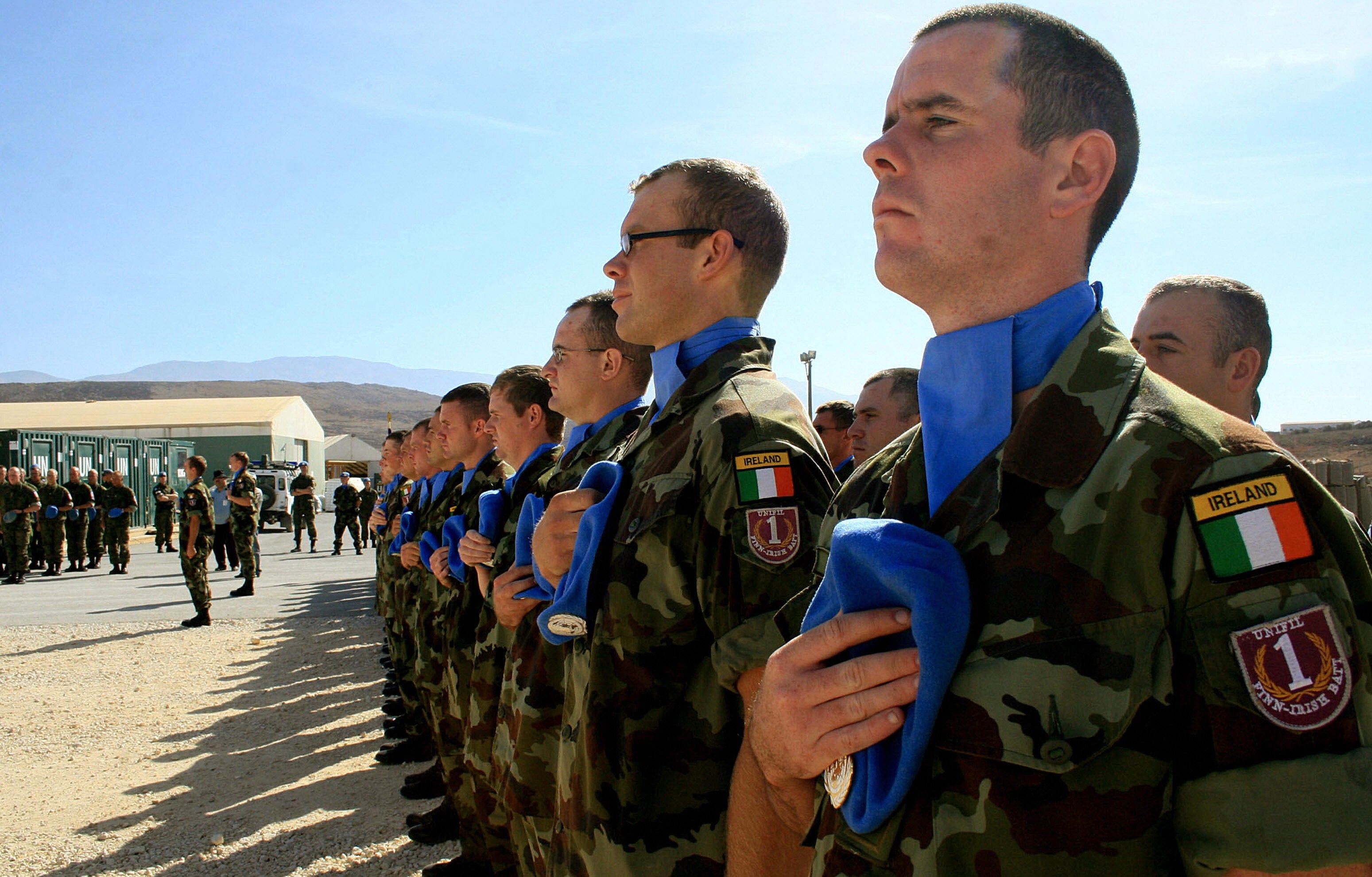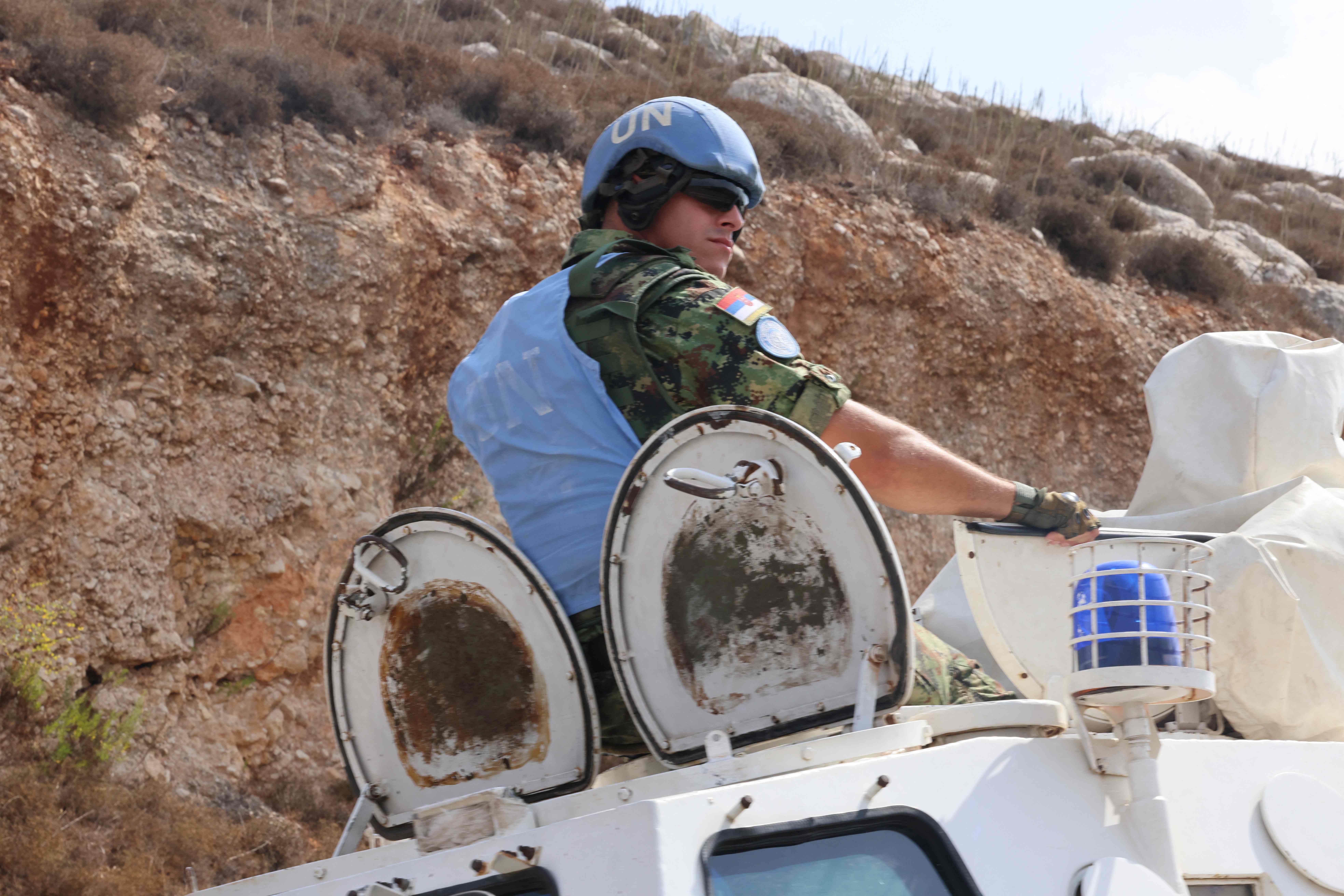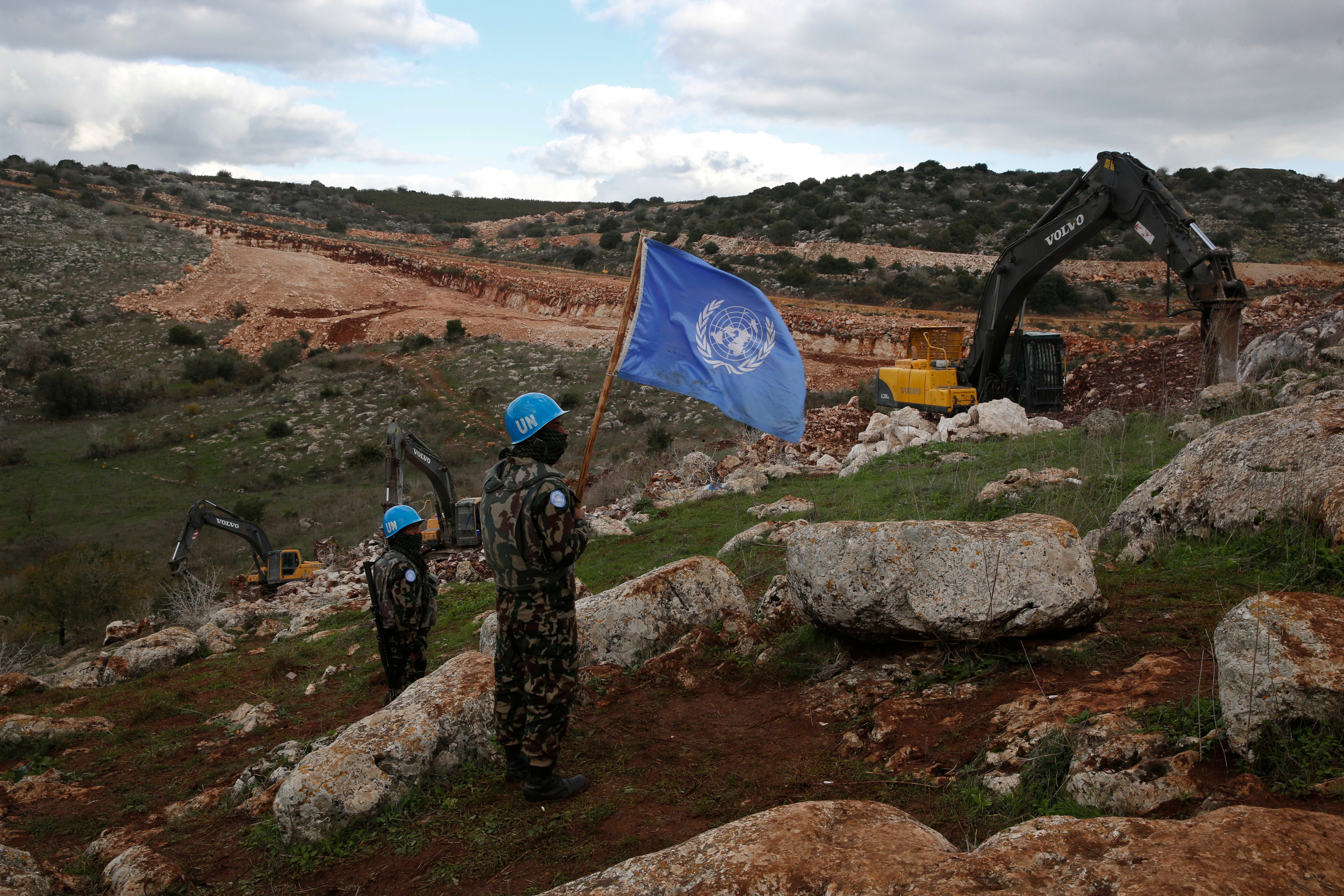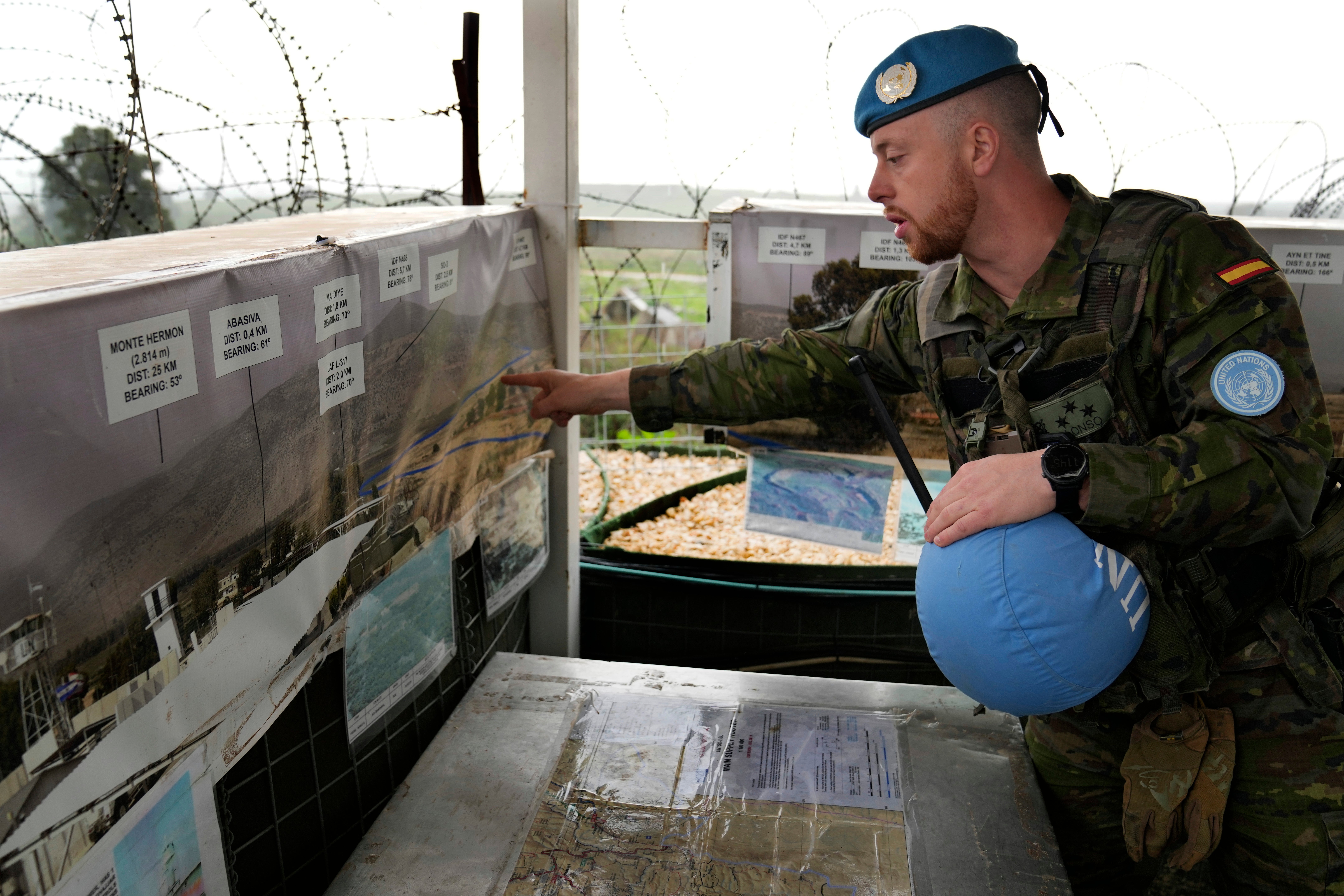Irish peacekeepers stood their ground in the face of an Israeli invasion of Lebanon. It’s not the first time
Irish peacekeepers have a long history of putting themselves in the firing line in Lebanon — and becoming so close with locals that people speak English with a Cork accent, Richard Hall writes

Your support helps us to tell the story
This election is still a dead heat, according to most polls. In a fight with such wafer-thin margins, we need reporters on the ground talking to the people Trump and Harris are courting. Your support allows us to keep sending journalists to the story.
The Independent is trusted by 27 million Americans from across the entire political spectrum every month. Unlike many other quality news outlets, we choose not to lock you out of our reporting and analysis with paywalls. But quality journalism must still be paid for.
Help us keep bring these critical stories to light. Your support makes all the difference.
The 30 Irish peacekeepers carried only rifles and small arms. The Israeli force was preparing to advance with all the tools of a military superpower: tanks, aircraft, drones, heavy artillery and thousands of troops.
But when the Israelis ordered the Irish soldiers to vacate their observation post on the Lebanon-Israel border last week to clear the way for their invasion, they refused.
The incident, which sparked a tense stand-off and diplomatic spat, was just the latest in a long history of confrontations between the Israeli army and the United Nations peacekeeping force in Lebanon, known as UNIFIL.
UNIFIL was set up in 1978 to monitor Israel’s withdrawal from the south of the country and ensure that militant groups did not operate on the Lebanese border. More of a peacekeeping mission than a fighting force, the soldiers in their distinctive blue helmets have been outgunned by the better-equipped warring sides for UNIFIL’s entire existence.
Irish peacekeepers have been part of this difficult mission from the very start. They have lived through two prior Israeli invasions of southern Lebanon, and been in the firing line many times before.
“This was a regular occurrence,” John Durnin, an Irish former UNIFIL commander who did five tours with the peacekeeping force, told The Independent.

Durnin was a platoon commander with UNIFIL in 1982. Then, too, the Israelis invaded Lebanon to fight a different enemy, the Palestinian Liberation Organization.
“I remember I was in an outpost that was cut off by them, and the instructions were to make a token resistance, in the sense that we were to put out tank stops and just block the roads. But they just drove past them with their tanks,” he said.
UNIFIL’s mandate was never to confront either side militarily, but to monitor and intervene where they could to protect lives.
“In my experience, we kind of kept manners on the Israelis. In other words, we kept them from committing the more serious actions, or for want of a better word, atrocities, that they might have committed if we hadn’t been sitting there watching them or tailing them around, as we often did ,” he said.
“We frequently rescued civilians who had been cut off or isolated by the fighting,” he added.

Nearly 20 years have passed since the last full-blown war between Israel and Hezbollah, the Shia militant group and political party. This new round of devastating fighting began in the days after the Hamas attacks of October 7, 2023, when Hezbollah began firing rockets into Israel in support of Hamas and Palestinians in Gaza.
Israel began a widespread bombing campaign across Lebanon in late September that has killed more than 2,229 Lebanese — including Hezbollah fighters, civilians and medical personnel — according to the Lebanese health ministry. The bombings have severely weakened Hezbollah’s leadership and capabilities.
As well, Hezbollah attacks have killed 29 civilians and 39 Israeli soldiers.
The UN peacekeepers have been in the line of fire again. UNIFIL said the Israeli army had “repeatedly hit” UN positions in the space of 48 hours, hitting a watchtower, disabling cameras, and injuring multiple peacekeepers.
The Israeli military said it had identified a threat and responded, and that the intended target of Israeli fire was located some 50 meters from the Unifil position.
UNIFIL is an international force that has some 10,000 soldiers from around the world. Ireland’s contingent consists of around 370 troops from the Irish Defence Forces’ 124th Infantry Battalion.
They have been operating in the area for so long that some Lebanese locals speak English with a thick Irish accent, with noticeable regional differences.
“If you met a Lebanese villager, you could tell what village he was from based on his accent. If he had a Cork accent, he was from Hadatha, because that’s where the Cork company was based. If he was from Baraachit, they speak with a very strong Athlone accent,” said Durnin.

During his five tours, Durnin got to know young Lebanese kids who grew up into fighters.
"The first time I went out in 1982 and I met little Abdul, Muhammad and Hasan,” Durnin said. “They were little kids, and you’d meet them, you’d throw them sweets or toys and so on. And I came back five years later and they’re teenagers, and you’d be playing football with them. But a few years later, now they are ‘terrorists’ or resistance or whatever.”
But having seen them grow up made a difference. “You knew them, so you didn’t have to shoot them,” Durnin said. “You could talk to them, and you could give them a good kick up the behind, and it tended to work."
The story of the Irish contingent of UNIFIL is, like the entire peacekeeping force, one filled with tragedy. It is often given added importance in Ireland because of the country’s affinity with the Palestinian cause, a complicated story of its own, borne in Ireland’s history in battling colonialism.
The Independent’s legendary foreign correspondent, Robert Fisk, wrote of the Irish contingent to UNIFIL many times in this publication throughout his years of reporting from Lebanon.
“The Irish will then leave behind a land that looks like County Mayo, in which they have been loved, harassed, insulted, murdered and maligned. But their peacekeepers stayed on through the worst shellfire and the most deliberate killings,” Fisk wrote in 2001.
Some 49 Irish soldiers have lost their lives in their decades-long mission.

Durnin, now retired, sees many parallels between previous Israeli invasions of Lebanon and today.
“The Israelis would issue what they called shell warnings, in that they would tell you that they would shell a certain area at a certain time and with the intent that we wouldn’t go there. But in fact, they were frequently inaccurate, both in times and in locations of their warnings,” he said.
Durnin called the Israeli tactics “recce [reconnaissance] by fire.”
“That means before they move into a certain area, they would just shoot all around them. And it really doesn’t matter who’s there,” he said.
Israeli airstrikes have devastated southern Lebanon in recent days, with entire villages destroyed and more than one million people displaced.
Having watched numerous Israeli invasions of Lebanon play out, once up close, Durnin believes the outcome will be much the same.
“I’m not a political animal, but the Israeli methods seem to be the use of military force to solve a problem, and it doesn’t work long term,” he said.
“Out of that [1982] invasion was born [the militant group] Amal, and later Hezbollah.”
And while UNIFIL can’t stop the IDF in its tracks, Durnin has seen its worth.
“UNIFIL doesn’t have tanks, or heavy artillery, or aircraft that the Israelis have. All you can do is kind of get in the way act as a constraint, a brake,” he said.
Join our commenting forum
Join thought-provoking conversations, follow other Independent readers and see their replies
Comments